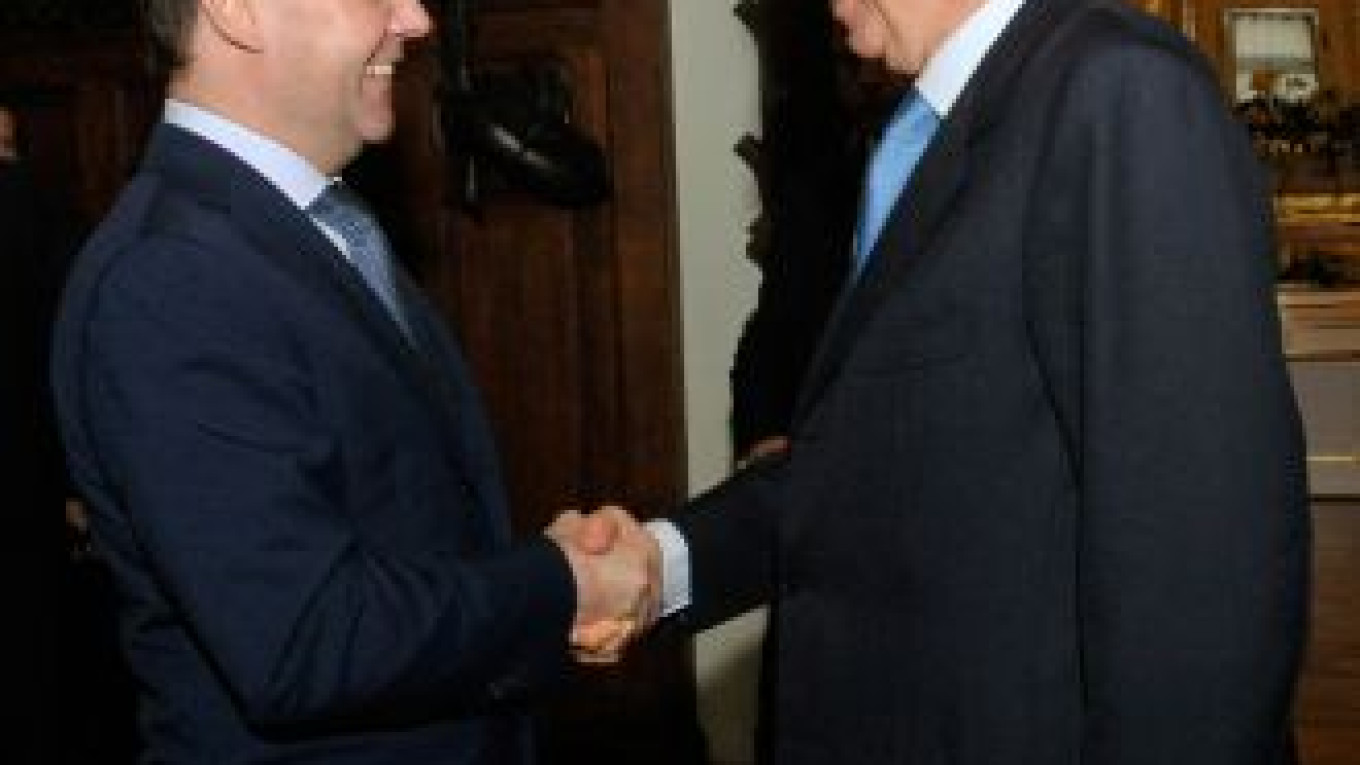Oil major Rosneft and Italian energy company Eni on Monday signed a landmark deal to finance oil and gas exploration at three offshore blocks.
The document, and a number of others, was signed at a meeting between Prime Minister Dmitry Medvedev and his Italian counterpart, Mario Monti, Interfax reported.
The agreement elaborates on a deal concluded in June and applies to the Fedynsky and Central Barents blocks in the Barents Sea and the Western Chernomorsky block in the Black Sea, Rosneft said.
Under the deal, Eni will fully finance exploration commitments stipulated by the block license requirements. Spending on exploration exceeding them will be split between the companies in line with their stakes in the projects.
Eni holds 33.33 percent in the blocks, while Rosneft owns 66.67 percent.
Eni will also cover expenses on exploration work that has already been carried out. The company's investment will be returned from project cash flows if production is launched at any of the blocks.
But Rosneft will not be obliged to return the investment if production does not begin.
The Fedynsky block has undergone a two-dimensional seismic survey, and nine prospective structures with 18.7 billion barrels of oil-equivalent in recoverable reserves have been discovered.
The Central Barents block neighbors Fedynsky to the north. Three prospective structures have been discovered there with total recoverable reserves of over 7 billion barrels of oil equivalent.
The third block for joint development is the Western Chernomorsky block in the Black Sea, where Rosneft has discovered six prospective structures with total recoverable resources of around 10 billion barrels of oil equivalent.
Rosneft has estimated total costs for its joint projects with Eni in Russia at $100 billion, $2 billion of which is for geological exploration, Interfax reported.
Meanwhile, mining conglomerate Norilsk Nickel signed a memorandum of understanding with Italian steelmaker Techint on a $1.8 billion project to reduce sulfur dioxide emissions at the Russian company's Medny and Nadezhdinsky plants on the Taimyr Peninsula.
A consortium led by Techint and including companies from France, Austria and Belgium won a tender for the right to carry out the project.
Norilsk Nickel said 95 percent or more of sulfur dioxide produced at the two plants would be used.
Also at the meeting, Gazprombank and Italian bank Intesa Sanpaolo concluded an agreement to set up a 300 million euro ($363 million) private equity fund.
The fund will support the operations of Italian and Russian businesses in Russia and EU countries. The banks said in a press release that each of them would own 50 percent in the fund.
Intesa Sanpaolo also signed a deal to lend funds to VTB to finance the 276 million euro VTB-Arena Park real estate project. It covers an area of 31 hectares, while the building site area is 850,000 square meters.
The project will include auxiliary infrastructure at the Dinamo Stadium, 68,200 square meters of office space, 142,000 square meters of residential buildings, a hotel with 310 rooms and a conference hall.
Another Italian company, property developer Rizzani de Eccher, signed a protocol of intent with North Caucasus Resorts to invest about 1 billion euros to build hotels and commercial infrastructure in Russia's southern regions.
North Caucasus Resorts develops ski, beach and spa resorts in the North-Caucasus federal district, Krasnodar region and republic of Adygea.
A Message from The Moscow Times:
Dear readers,
We are facing unprecedented challenges. Russia's Prosecutor General's Office has designated The Moscow Times as an "undesirable" organization, criminalizing our work and putting our staff at risk of prosecution. This follows our earlier unjust labeling as a "foreign agent."
These actions are direct attempts to silence independent journalism in Russia. The authorities claim our work "discredits the decisions of the Russian leadership." We see things differently: we strive to provide accurate, unbiased reporting on Russia.
We, the journalists of The Moscow Times, refuse to be silenced. But to continue our work, we need your help.
Your support, no matter how small, makes a world of difference. If you can, please support us monthly starting from just $2. It's quick to set up, and every contribution makes a significant impact.
By supporting The Moscow Times, you're defending open, independent journalism in the face of repression. Thank you for standing with us.
Remind me later.


